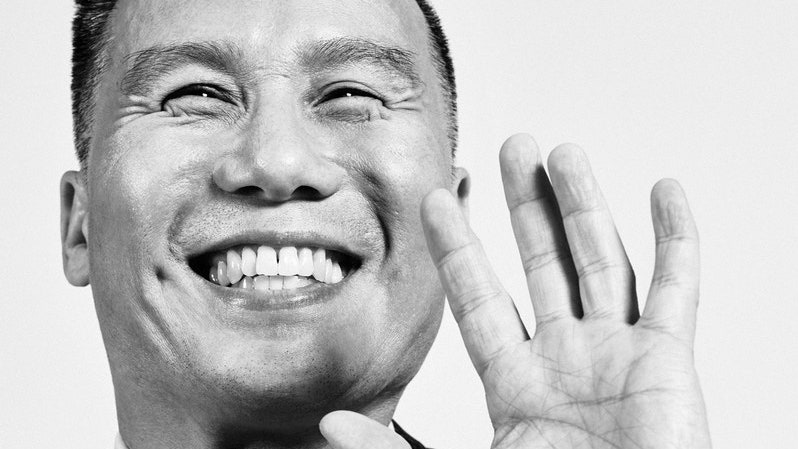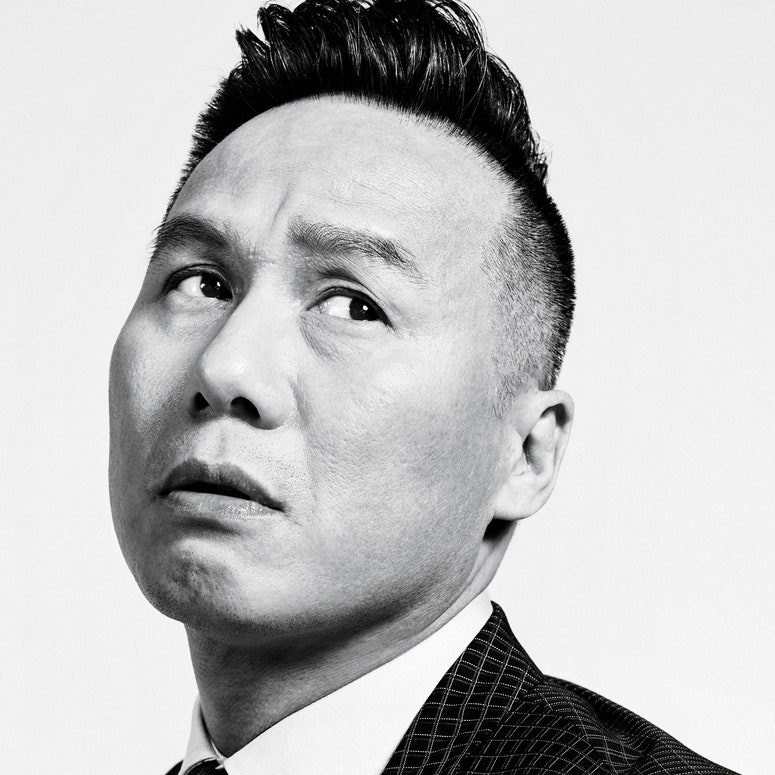BD Wong gave up the idea that he could be a leading man long ago, at least in Hollywood. Sure, in the last 30 years, he’s won a slew of awards, starred in several beloved television shows, and returned to the big screen as part of the Jurassic Park franchise. But none of that matters—not even his Tony Award—because he will always be relegated to supporting roles. Basically all Asian actors are.
“I want bigger parts in movies, and I don't want to have to rely on a franchise to bring me back into the movie theater,” he says, seated in a red vinyl restaurant booth only a few minutes away from his current gig, an off-Broadway coming-of-age play about basketball. “I always want more.”
Wong wants you to know that he is grateful, of course. He’s aware the reality of the business is, statistically, “crazy hard.” For every part he gets, there are dozens, sometimes hundreds, of people he was chosen over. But it’s just that people have been asking him questions about diversity his entire career—which means he’s been giving answers for a long time.
You’ve been doing this for three decades. Are things getting… better?
“I can make sense of it all and give you a timeline, but really, it's all the same,” he says in between sips of his iced tea. “There will always be a majority—a majority that has power and can make decisions—and that's not really going to change.” He questions the role of hope, especially in current American politics in order to get things done: “Do we need to feel that there's an end to white privilege in order to work against it?”
He apologizes for sounding cynical. “We’re always going to be the underdog. The tables will never really be turned.” I’m surprised to hear Wong use the word “we.” He might mean Asians, since we're both Chinese. He might mean queer (again, both of us). Regardless, I can't help but feel solidarity with him. Wong has the experience, versatility, a face that never seems to age. If he’s done everything right, and still doesn’t get what he deserves, how much has the entertainment industry really changed?
He’s been lucky in some ways. After his star-making turn as Song Liling in the controversial play M. Butterfly, he returned to Broadway as Linus in You’re a Good Man, Charlie Brown and the Reciter in the revival of Pacific Overtures. His “really meaty parts” in television include Father Ray Mukada on Oz, and 230 episodes as FBI psychiatrist Dr. George Huang on Law & Order: SVU. More recently, Wong’s had recurring roles on Gotham and Mr. Robot, the latter of which gave him his first Emmy nomination last year. But too often, he’s typecast as a medical professional: Dr. Stuart Kim (All-American Girl), Dr. Kai Chang (Chicago Hope), Dr. Ren (Stay), Dr. Gabriel Lee (NCIS), and Dr. Wu (Nurse Jackie)—and that’s not even a complete list.
After Wong left SVU, he says he wasn’t hireable for years. He had one rule: "No more psychiatrists." But he broke it for the role of Dr. Jonathan Lee on Jason Isaacs’ show Awake. “I really didn't want to, but it was a great part and it was very different and I was happy to do it. After that, I had a couple of years where I was like”—he taps an invisible mic—“Is this thing on?”
Wong still worries about seeing a lab coat on the rack during a fitting for a new show. In the most recent installations of the Jurassic Park franchise, Wong ditches the white cotton garment for more tailored jackets and suits, but he’s still the same lab-coat character: biotechnologist and geneticist Dr. Henry Wu. Like in the original film, Dr. Wu’s Jurassic World appearances are fairly brief. However, Wong’s made his small part in one of the year’s biggest blockbusters quietly subversive. His character is now an unapologetic, egotistical person, constantly mansplaining the complexity of his research. He might be a scientist, sure, but in many ways he’s the opposite of the Hollywood stereotype of a quiet Asian man who simply follows orders.
“I spend so much energy trying to avoid all of that stuff,” Wong says. “That feels like the best way to make Dr. Wu an individual, the best way to steer away from anything people are expecting.”
In Fallen Kingdom, Dr. Wu’s abilities and forward-thinking research about modern dinosaurs have been pushed into a commercial endeavour for someone else’s profit again. “The only way the character can continue to do this technology is through these people paying for his labs,” Wong says. Playing the game, so to speak.
From Wong’s perspective, Dr. Wu is desperate, which is why he’s so intense. “If he removed himself from the situation, if he quit, he would have nothing. He wouldn't have the lab resources. He'd have to start all over.”
Clearly, Wong can relate.
And yet, the stage continues to offer BD Wong everything Hollywood won’t.
His off-Broadway and regional credits include Bondage, David Henry Hwang’s play about sadism, masochism and race; four productions of the ambitious one-man musical Herringbone, which required him to act, sing, and dance as 11 different characters; Ming, a Chinese-American gay man in the off-Broadway play A Language of Their Own; being part of the cast of the off-Broadway musical As Thousands Cheer; and the suave and mysterious General Gong Fei in the melodrama Shanghai Moon. In 2014, Wong also returned to his hometown of San Francisco for the part of physician Cheng Ying in the American Conservatory Theater’s production of The Orphan of Zhao.
In many of these shows, Wong’s ethnicity was actually an advantage. Not having to pretend to be someone else, especially a psychiatrist, often gives him the space to really show what he can do.
But soon after the success of M. Butterfly, Wong observed how easily non-white actors like himself could be put into a box. In an interview with The New York Times about The Tempest, he tells novelist Ellen Pall his aspirations are a bit bigger than his role as the spirit Ariel. “'Wouldn't it be great if I could play Ferdinand?”—that’s the romantic lead—”I'd like to play Ferdinand.''
One thing Wong doesn’t have to hide, especially in the world of theater, is his personal life. In 2003, Wong came out in a very public interview with The Advocate. But earlier this month, The New York Times published a feature about Lee Pace’s complicated experience of coming out while performing in the current production of Angels in America. Wong still remembers the worry he felt before he told his own story. “How am I going to be punished? What will the recourse, the ramifications, the consequences be?’” he says. “I don't think it's one of those things that's going to go away, the idea that actors are going to be afraid of coming out.”
Even if an actor has been in the business for twenty or thirty years, whether or not they are successful depends on so many factors. Mental health. Emotional stability. Their physical appearance. Wong says all of those can do a number on a person’s self-esteem and their sense of confidence or self-definition. It’s also why there’s such a backlash against diversity.
“We're all doing that same thing,” Wong says. “Bad behavior, bad decisions, bad statements, bad grooming, all of it can bite you in the ass. So, of course something like your sexuality or the audience's perception of how credible you are as a man with a woman is going to come into play. And it's going to mess with your head.”
Wong’s latest theatrical project is all about someone who decides to put their credibility on the line. In the off-Broadway production of The Great Leap, Wong portrays Wen Chang, a basketball coach at Beijing University involved in a historic match between China and the U.S. teams. The story spans two decades. The theater is small. On the day I am in the audience, it is the 29th anniversary of the Tiananmen Square protests portrayed in the show.
Wen Chang summarizes what Chinese people have been taught for decades because of the Cultural Revolution: “Growing up, you did not want to be someone. You wanted to be the person three people behind someone. Because being someone could get you killed.”
The show connects the experience of Chinese-American immigrants, the sacrifices they made for their children, and the struggle between pursuing your dreams versus doing what is expected. The final scene hits me like a wave, and as the iconic image fades from the wall, I find myself crying.
After I say goodbye to a friend, I hang around outside of the theater. Wong and I chat briefly. Weeks later, he still remembers it. He says in that moment, we started a relationship. “You said, ‘This is who I am and this is what your work means to me, because of who you are and who I am.’” Wong looks right at me with a grin. “That's interesting to me. Normal fame is not like that.”
None of the things people seem to like about being famous are interesting to Wong. He doesn't want to talk to people on the street. He doesn’t like to take pictures with them, or give them something of himself when he hasn’t gotten anything from them. He finds it all deeply uncomfortable. “Your normal interaction is very needy and selfish,” he says.
It’s a situation many actors like Wong can’t get out of either, in order to make a living. “Very few of us are really self-generating,” he says. He means someone like Reese Witherspoon, who is now inking deals with companies like Apple and helping produce projects like HBO’s Big Little Lies, a show she also stars in. Make your own opportunities. “The whole notion that women over 40 have a tremendous challenge getting parts that are right unless they're self-generating is an example of how there are things built into the system that are inherently extremely challenging for actors of all different types. We're always going to be feeling like we have to suck up to people.”
The solution? Writing more. Last year, musical theater students at San Diego State University performed a film-to-musical adaptation of Mr. Holland’s Opus. It was based on the 1995 movie, but the lyrics and libretto were written by Wong, who also directed. He also describes working with Chinese-American playwright Lauren Yee on The Great Leap as a rare opportunity he was lucky enough to have the time for.
After 90 minutes of chatting, I’ve made Wong late for that night’s performance. Just before he runs back to the theater a few blocks away, he puts on his sunglasses and hugs me. He also reflects back on something I said earlier, about how shocking it was to hear Wen Chang talk to the audience like an American. A lesson I wish I had learned much earlier in life.
“It shouldn’t be jarring,” he says with a smile. “You just can’t be passive.”
His last lines in the play as Wen Chang still haunt me. “My whole life, I had been taught that it was not my moment. But now I see: It has always been my turn.”

